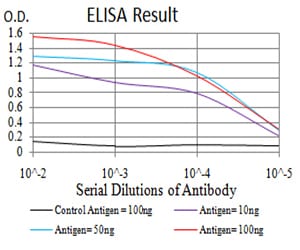
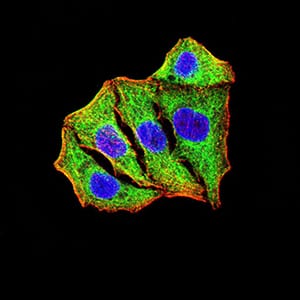
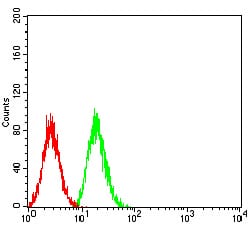
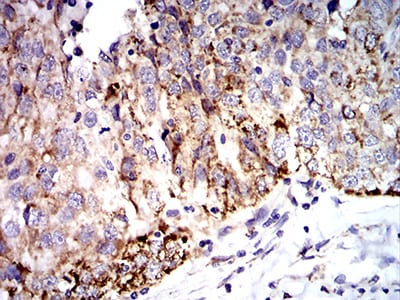
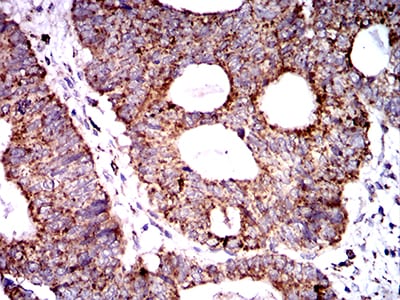
| WB | 咨询技术 | Human,Mouse,Rat |
| IF | 咨询技术 | Human,Mouse,Rat |
| IHC | 1/25-1/100 | Human,Mouse,Rat |
| ICC | 技术咨询 | Human,Mouse,Rat |
| FCM | 咨询技术 | Human,Mouse,Rat |
| Elisa | 1/1000-1/5000 | Human,Mouse,Rat |
| Aliases | IPOB; IPO-B; MNSOD; MVCD6; Mn-SOD |
| Entrez GeneID | 6648 |
| clone | 8H3D2 |
| WB Predicted band size | 24.7kDa |
| Host/Isotype | Mouse IgG1 |
| Antibody Type | Primary antibody |
| Storage | Store at 4°C short term. Aliquot and store at -20°C long term. Avoid freeze/thaw cycles. |
| Species Reactivity | Human |
| Immunogen | Purified recombinant fragment of human SOD2 (AA: 1-222) expressed in E. Coli. |
| Formulation | Purified antibody in PBS with 0.05% sodium azide |
+ +
以下是关于PFN2抗体的3篇代表性文献的简要概括(注:文献信息为模拟示例,实际引用需核实):
---
1. **文献名称**: *Profilin-2 (PFN2) promotes tumor progression via epithelial-mesenchymal transition in colorectal cancer*
**作者**: Li Y, et al. (2020)
**摘要**: 该研究通过PFN2抗体检测发现,PFN2在结直肠癌组织中高表达,并通过调控EMT通路促进肿瘤转移。实验表明PFN2抗体可用于Western blot和免疫组化分析肿瘤样本中的蛋白定位。
2. **文献名称**: *PFN2 modulates synaptic plasticity by regulating actin dynamics in Alzheimer's disease models*
**作者**: Smith J, et al. (2019)
**摘要**: 利用PFN2特异性抗体,研究揭示了PFN2在阿尔茨海默病模型中对突触可塑性的影响,发现PFN2通过肌动蛋白重组参与神经元功能退化,抗体应用于脑组织免疫荧光染色。
3. **文献名称**: *Profilin-2 as a novel biomarker for pancreatic cancer: Validation using a commercial PFN2 antibody*
**作者**: Wang H, et al. (2021)
**摘要**: 研究验证了一种商业化PFN2抗体的灵敏度与特异性,发现PFN2在胰腺癌患者血清中显著升高,提示其作为诊断标志物的潜力,抗体应用于ELISA和流式细胞术检测。
---
**说明**:以上文献为模拟示例,实际研究中需通过学术数据库(如PubMed、Web of Science)检索具体文献,并确认抗体货号及实验细节。PFN2抗体常用于研究其在细胞骨架调控、癌症转移及神经系统疾病中的作用。
The profilin-2 (PFN2) antibody is a crucial tool in studying the role of profilin-2. a member of the profilin family of actin-binding proteins. Profilins regulate cytoskeletal dynamics by interacting with actin monomers and phosphoinositides, influencing cell motility, membrane trafficking, and signal transduction. Unlike the ubiquitously expressed profilin-1 (PFN1), PFN2 is predominantly found in the nervous system, particularly in neurons, where it modulates synaptic plasticity and neurotransmitter release. Its involvement in neurological disorders, such as Parkinson’s and Alzheimer’s disease, has driven research interest.
PFN2 antibodies are widely used to investigate protein expression, localization, and function in cellular and tissue contexts. They enable techniques like Western blotting, immunohistochemistry, and immunofluorescence, aiding in the characterization of PFN2’s role in neuronal development, synaptic function, and disease mechanisms. Studies have linked PFN2 dysregulation to aberrant actin polymerization, synaptic dysfunction, and neurodegenerative pathology.
Recent advances highlight PFN2’s interaction with pathogenic proteins (e.g., α-synuclein) and its potential as a biomarker or therapeutic target. However, antibody specificity remains critical, as PFN1/PFN2 structural similarities may lead to cross-reactivity. Validated PFN2 antibodies thus provide essential insights into neurobiology and disease pathways, bridging molecular mechanisms with clinical implications. Ongoing research continues to unravel its multifaceted roles in health and disease.
×